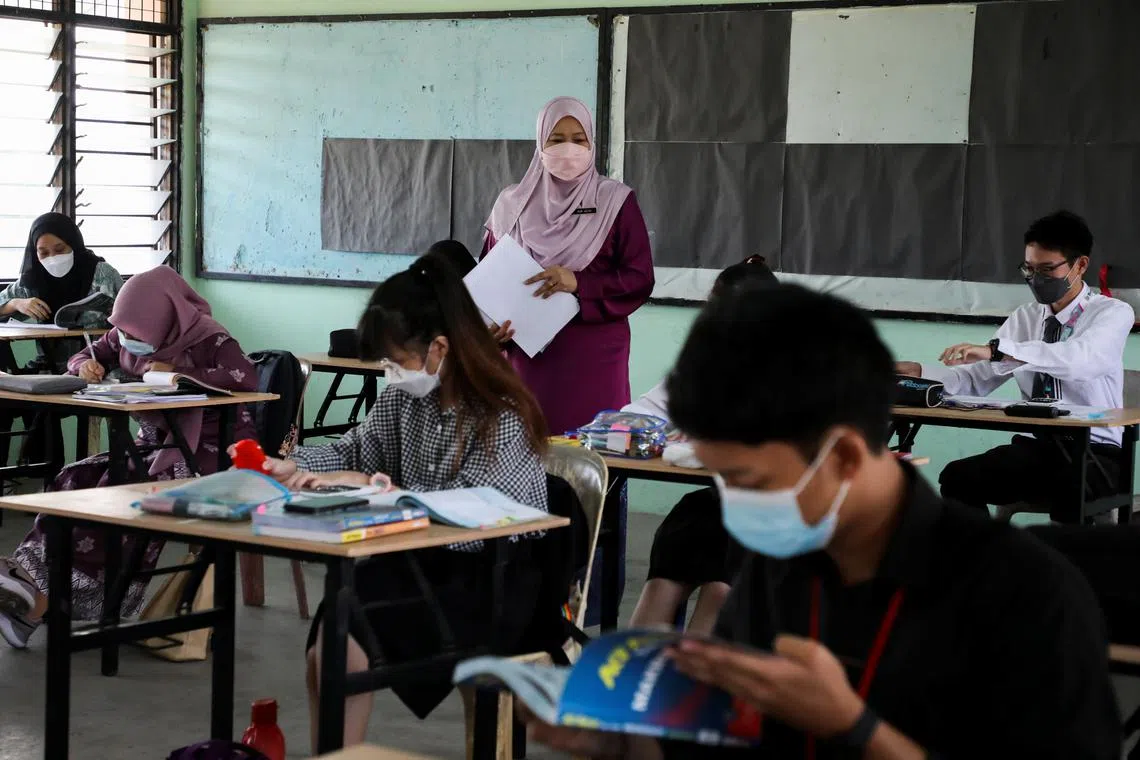Changes to Malaysia’s education system raise fears that students are not prepared for future
Sign up now: Get insights on the biggest stories in Malaysia

The Dual Language Programme, which has since 2016 allowed science and mathematics to be taught in English, is being reduced or scrapped altogether in several government schools in Malaysia.
PHOTO: REUTERS
KUALA LUMPUR – Changes to Malaysia’s education system that will see more primary and secondary students return to studying science and mathematics in Malay instead of English are raising the ire of parents and observers.
They say such a move will not enhance the employability of students in an era of globalisation.
The Dual Language Programme (DLP), which since 2016 has allowed the two core subjects to be taught in English, is being reduced or scrapped altogether in several government schools, according to education watchdog Parent Action Group for Education (Page).
“DLP schools and classes are being eradicated gradually and ever so discreetly,” Page chairman Noor Azimah Abdul Rahim told The Straits Times, adding that there is demand for the programme from students and parents.
She said this is based on information the group gathered from parents, parent-teacher associations and the Education Ministry.
According to Education Minister Fadhlina Sidek, the DLP is being phased out in some schools as it does not meet the ministry’s requirements for the programme, namely that their Malay-language results must meet the national average grade or be higher.
“Schools must meet certain conditions to conduct the programme, especially the requirement that the students’ Bahasa Melayu (Malay) results are as good as, if not better than, the ministry’s target,” she said in May, as reported by The Star.
Schools also have to meet the target for a number of years consecutively. “This is where most schools fail,” she said, explaining that half of public primary and secondary schools did not make the mark.
As at June 30, 2023, fewer than a quarter of schools nationwide conducted the DLP, or 2,428 schools out of a total of 10,233.
About 460,000 students were enrolled in the programme, representing about 9 per cent of the total student population in primary and secondary schools.
Datin Noor Azimah said that instead of getting rid of the DLP, the focus should be on raising the level of Malay proficiency.
“Unfortunately, the emphasis appears to be to attack students who are English-language proficient,” she said.
Already, Primary 1 pupils are put through a Malay-language assessment, and those found to be weak in Malay are advised to join a non-DLP class.
Ms Noor Azimah also said that parents and students are pressured by schools to opt for non-DLP classes and that the DLP may also be abolished at all public boarding secondary schools in 2024, save for the two top schools, Malay College Kuala Kangsar and Tunku Kurshiah College.
A parent, who wanted to be known only as Madam Aida, said that parents at her child’s school in Kuala Lumpur were initially assured by the headmistress that the school taught maths and science only in English. Her child, who is in Primary 1, was also given maths and science textbooks in English.
“A few weeks later, the textbooks were taken back, and my child was forced to learn maths and science in Malay. We feel that our children’s rights have been taken away, and that this was a decision made suddenly in haste, with no proper planning,” she told ST.
“Changes are always being made to our education system, making the kids a lab experiment. I just want my child to learn maths and science in English,” said the 49-year-old housewife.
In response to queries from ST, the Education Ministry said: “There is no directive, nor is there any move, to reduce or remove DLP classes from schools in Malaysia by the (Education Ministry) other than a directive to ensure that the implementation of DLP is in line with the existing legislation and the National Education policy.”
Contrary to the Page chairman’s claim that there is a demand for DLP classes, the ministry said a few schools applied for the closure of such classes “because there are no applications from students to join the programme”.
Page believes that reducing or scrapping the DLP could impact the government’s aim of producing more students well versed in science, technology, engineering and mathematics – or Stem subjects – to meet the future need for professionals in these areas.
Carmaker Tesla is establishing a regional headquarters in Malaysia, while spacecraft manufacturer SpaceX has begun providing Internet services in the country, particularly in remote areas. Amazon is also investing RM25.5 billion (S$7.4 billion) in Malaysia by 2037, with plans to develop a “cloud region” for data storage and other cloud-based services.
Malaysia’s education policy has long been seen as a tool to advance political influence, with issues such as the medium of instruction and vernacular schools often becoming political hot potatoes.
Changes are commonly made to the system with every incoming education minister.
For example, the long-running debate on using English at national schools was first sparked in 2003, when then Premier Mahathir Mohamad introduced the use of English to teach maths and science
In 2009, then Education Minister Muhyiddin Yassin decided that the English-medium education policy would be phased out by 2012, saying that the policy was not working. The move was seen as an attempt to win back the rural Malay and minority votes.
In 2016, the DLP was introduced in several schools under the Najib Razak government, but with little fanfare.
The current government of Prime Minister Anwar Ibrahim has also announced plans to introduce a new module in schools to teach the 40 hadiths, or sayings of Prophet Muhammad, drawing criticism from non-Muslims.
Analysts say this move appears to be aimed at Malay-Muslim voters, whose support the unity government is hoping to reclaim after August’s state elections showed voters switching from Barisan Nasional, a key partner in the ruling coalition, to the opposition Perikatan Nasional (PN), led by the fundamentalist Parti Islam SeMalaysia (PAS).
“He (Anwar) is trying to implement actions and policies that make him look more Islamic and appeal to the so-called Islamic vote or the PAS vote.
“He knows that he lost the Malay vote in the last general election and the six state elections, so he is trying to reclaim the Malay vote, and he thinks that the easiest way to do it is to play the Islamic card,” University of Tasmania’s professor of Asian studies James Chin told ST.
Dr Azmil Tayeb, visiting senior fellow at ISEAS – Yusof Ishak Institute in Singapore, told ST that removing the DLP will not have much of an impact on attracting Malay votes and may be counterproductive in urban areas as it is popular with urban Malay parents.
Meanwhile, the government’s move to introduce the Hadith 40 syllabus could be “a start in countering the hardline Islamic discourse propagated by PN”, said Dr Azmil. But he added that “a lot still needs to be done” when it comes to spreading the counter-narrative in the Malay society.
Critics say that Datuk Seri Anwar should be reforming the education system rather than further Islamising government schools.
Political observer and former diplomat Dennis Ignatius wrote on his website on Aug 30 that the country’s education policy should focus more on preparing students for the future.
“The general conclusion among educationists is that too much time is currently being devoted to religious instruction at the expense of subjects more relevant to the job market and to nation building. As it is, more time is spent on religious education than on science or maths, for example,” he wrote.



